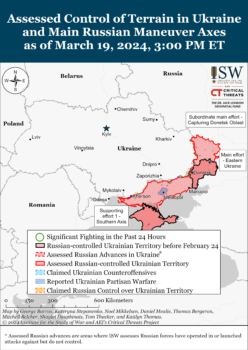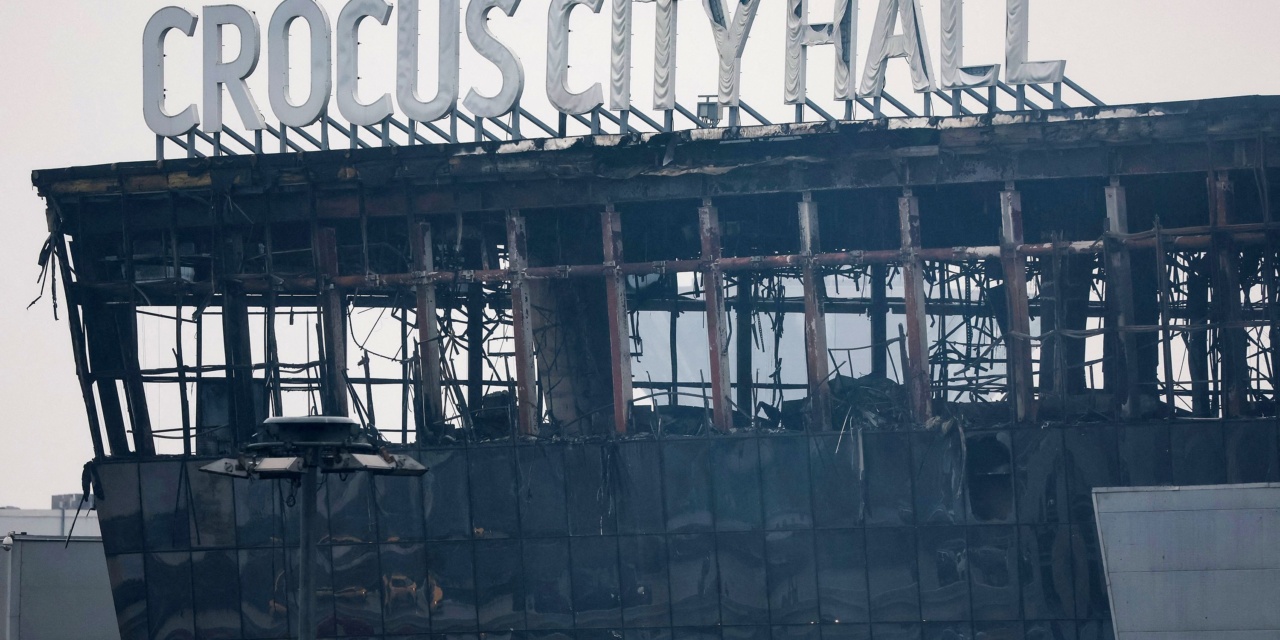The Crocus City Hall near Moscow, burnt out after an Islamic State mass killing, March 23, 2024 (Stringer/AFP/Getty)
Monday’s Coverage: A Memorial for Victims of Russia’s Mass Killings in Bucha

Map: Institute for the Study of War
UPDATE 1604 GMT:
UN High Commissioner for Human Rights Volker Türk says Russia’s 25-month invasion has killed more than 10,500 Ukrainian civilians and injured more than 20,000.
“The conflict increasingly is becoming entrenched and protracted, punctuated by recurring waves of attacks, as seen across the country last week,” he said in a speech no Tuesday.
UPDATE 1533 GMT:
Speaking ahead of meetings in Paris with French ministers, US Secretary of State Antony Blinken said, “It is absolutely essential to get Ukrainians what they continue to need to defend themselves, particularly when it comes to munitions and air defenses.”
He sent a message to Republicans in the US House holding up $60.1 billion in aid for Ukraine, he emphasized, “It’s another reason why the supplementary budget request that President Biden has made to Congress must be fulfilled as quickly as possible.”
Blinken and French Defense Minister Sébastien Lecornu visited a factory of the arms producer Nexter, which is seeking to double production of Caesar self-propelled howitzers.
UPDATE 1049 GMT:
A Chechen man, arrested in Moscow soon after the March 22 attack on the Crocus City concert hall, died in police custody a few hours later.
Askhab Uspanov was arrested at a bus stop while he was on his way to visit his wife at her workplace, said his mother Taisa Uspanova. When his wife arrived at the police station two hours later, she was informed that her husband “was no longer alive”.
Chechen opposition Telegram channel 1ADAT posted that masked individuals attacked Uspanov at a bus stop. Not understanding they were law enforcement, he resisted. Uspanov was tortured after his arrest: his spine and ribs were broken, and his body was covered in bruises and showed signs of strangulation.
1ADAT said security forces staged Uspanov’s suicide by hanging. His mother added that her son would not have harmed himself.
UPDATE 1042 GMT:
Ukraine air defenses downed 9 of 10 Iran-type attack drones launched by Russia overnight.
The Russians also fired an X-59 aircraft guided missile.
Debris from downed drones caused two fires in the Dnipropetrovsk region, damaging a two-story building and a fire station in Dnipro. In the Kirovograd region, an energy infrastructure facility was damaged.
There were no casualties.
UPDATE 1028 GMT:
A “defense source” in Kyiv has confirmed that Ukraine’s GUR military intelligence agency was behind today’s drone strike more than 1,200 km (744 miles) inside Russia (see 0937 GMT).
Sources said the strike on the Republic of Tatarstan hit a facility where Iran-type Shahed “kamikaze” drones are assembled, starting a fire.
UPDATE 1002 GMT:
A Moscow court has sentenced Pyotr Verzilov, the former publisher of the independent site Mediazone and member of the band Pussy Riot, to 8 years and 4 months in prison.
Verzilov was condemned in absentia for “fake news” about the Russian army. His “crime” was posts on Twitter and Instagram about mass killings of civilians by Russian forces in the Kyiv suburb of Bucha in March 2022.
Last month, the State security service FSB opened a treason investigation against the activist.
Verzilov left Russia in 2020 after a criminal case was opened against him for failure to notify authorities of his Canadian citizenship. In 2021, he was declared a “foreign agent”.
Last week, the same court sentenced Pussy Riot activist Lyusya Shtein to six years in absentia, invoking censorship laws.
Share
UPDATE 0937 GMT:
Ukraine has reportedly carried out a drone strike more than 1,200 km (744 miles) inside Russia.
The Russian site RBC reported explosions close to industrial facilities in the republic of Tatarstan on Tuesday..
The press service of the head of the Tatar Republic, Rustam Minnikhanov, posted on Telegram, “Drone attacks took place against factories in Tatarstan at Yelabuga and Nizhnekamsk….[They] did not cause serious damage and the activity in the factories was unaffected. Unfortunately, in Yelabuga, people were wounded.”
The special economic zone near Yelabuga has chemical, mechanical engineering, and metal treatment factories. One is believed to be used for the assembly of Iran-type Shahed/Geran “kamikaze” drones.
The large Taneko oil refinery is in Nizhnekamsk.
Ukrainian social media channels claimed the attacks were carried out by UJ-22 drones of the military intelligence directorate HUR. Security forces in Tatarstan were put on high alert.
Ukrainian drone strike in Yelabuga, Tatarstan, where Russia built a facility to make Shahed drones. It is the longest range strike so far, some 700 miles away. pic.twitter.com/ruAJDTUOld
— Yaroslav Trofimov (@yarotrof) April 2, 2024
ORIGINAL ENTRY: Before the March 22 attack on the Crocus City concert hall, killing at least 143 people, Iran warned Russian officials about a possible assault by the Islamic State.
“Three sources familiar with the matter” confirmed that Tehran told Moscow of the likelihood of a “major terrorist operation” by ISIS-Khorasan, the Islamic State affiliate based in Afghanistan.
On January 3, a double bombing by ISIS-K killed 94 civilians and wounded 284 at a march in southeast Iran marking the fourth anniversary of the US assassination of leading Iranian general Qassem Soleimani.
The Iranians, allied with Russia on political and military fronts from Syria to Ukraine, reportedly gave no details about the possible timing or target of the ISIS-K operation.
Kremlin spokesperson Dmitry Peskov and the Russian Presidential Representative for Afghanistan, Zamir Kabulov, both denied that any warning had been given.
Hours after the Crocus City attack, in which four attackers shot concertgoers at point-blank ranges and then detonated explosives, US officials said they had passed intelligence to Russia on March 7 about a possible operation.
The American message reinforced the March 6 announcement of the Russian State security service FSB that it had foiled a planned ISIS raid on a Moscow mosque.
But the Kremlin also issued a denial of that warning.
Instead, Vladimir Putin and the Kremlin’s propaganda machine maintained their attempt, with no evidence, to blame Ukraine for the Crocus City killings.
On Monday, Russia’s foreign intelligence service SVR declared that the US is attempting to cover up Kyiv’s “responsibility” for attack, including with the blame of ISIS-K.
Meanwhile, Russian authorities are stepping up a crackdown on foreign nationals in the country, with hundreds expelled from St. Petersburg and other cities in recent days.
The Internal Affairs Ministry announced on Friday that it is preparing a bill tightening Russia’s migration policy. Measures include the requirement that all foreigners undergo fingerprinting and photographing upon entering Russia; the creation of a government system with the digital profiles of foreigners; a new identification document for all foreigners confirming their right to live and work in Russia; reductions on the limits on how long foreigners can temporarily stay in Russia; and authorizations for courts and federal executive bodies outside of courts to deport foreigners who “pose a security threat”.


Did ISIS act alone? Why does Russia want the head of Ukraine’s SBU extradited? Does it have to do with the Crocus City Hall attack or other terror attacks in Russia?